Evidence-Based Practice in Mental Health
VerifiedAdded on 2020/06/05
|8
|2485
|50
AI Summary
The assignment delves into the multifaceted realm of evidence-based practice within mental health. It examines scholarly articles outlining the historical evolution, benefits, and challenges associated with this approach. The review covers diverse areas like treatment dissemination for PTSD, community-based interventions for Native American communities, and the delivery of mental health services through innovative models. Additionally, the assignment explores the common factors perspective on evidence-based practice in psychotherapy and delves into topics such as permanent supportive housing and its effectiveness in addressing mental health needs. Overall, the assignment provides a comprehensive analysis of evidence-based practice within the context of mental health.
Contribute Materials
Your contribution can guide someone’s learning journey. Share your
documents today.
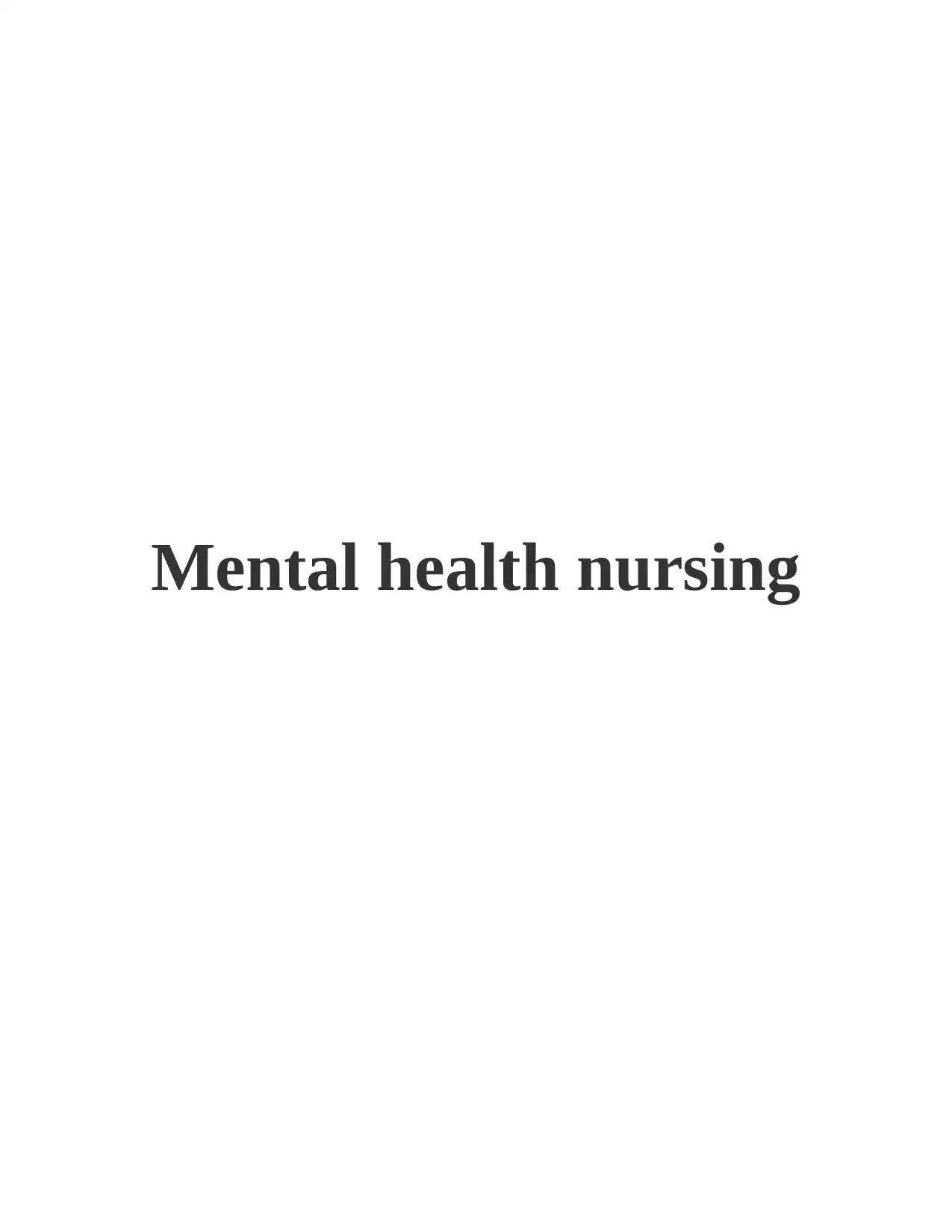
Mental health nursing
Secure Best Marks with AI Grader
Need help grading? Try our AI Grader for instant feedback on your assignments.
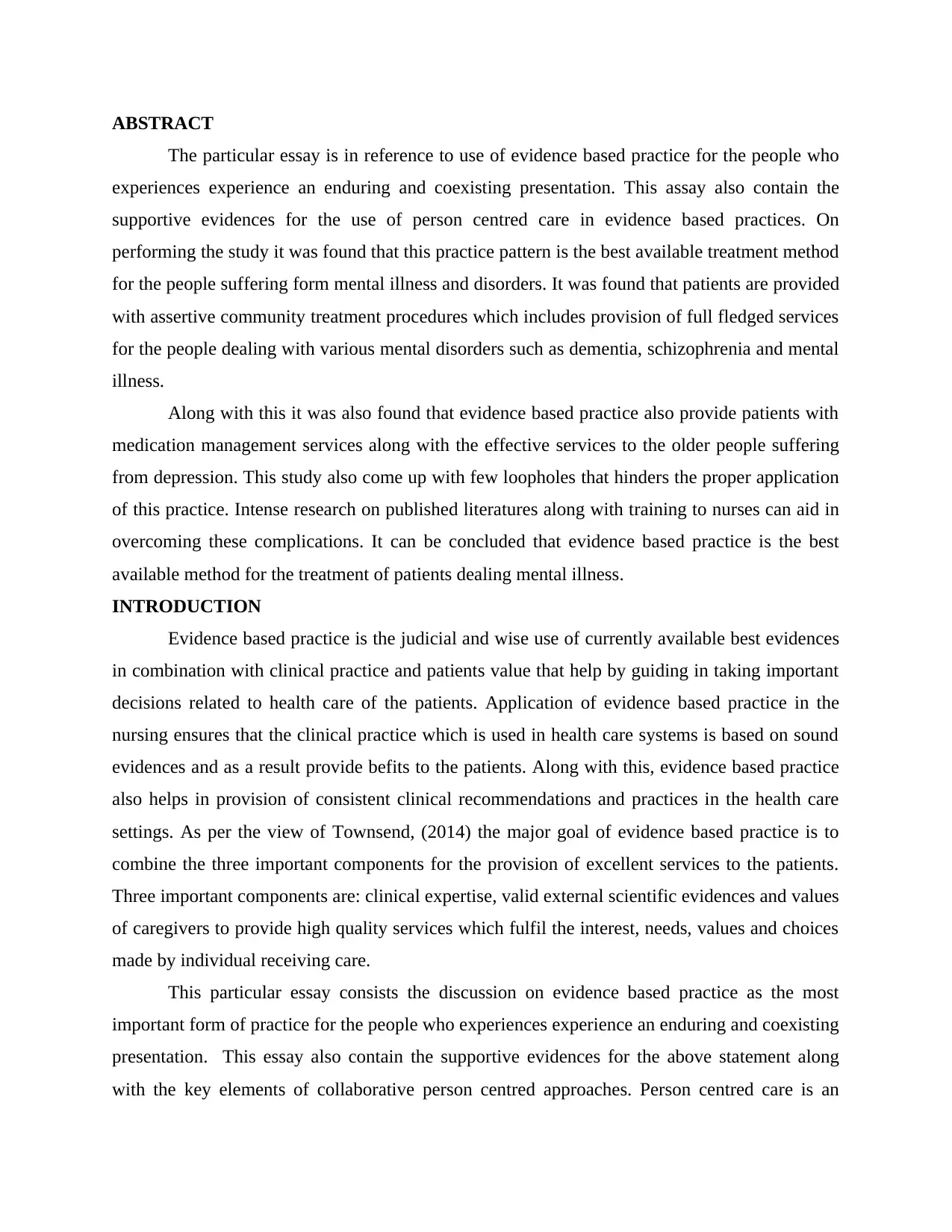
ABSTRACT
The particular essay is in reference to use of evidence based practice for the people who
experiences experience an enduring and coexisting presentation. This assay also contain the
supportive evidences for the use of person centred care in evidence based practices. On
performing the study it was found that this practice pattern is the best available treatment method
for the people suffering form mental illness and disorders. It was found that patients are provided
with assertive community treatment procedures which includes provision of full fledged services
for the people dealing with various mental disorders such as dementia, schizophrenia and mental
illness.
Along with this it was also found that evidence based practice also provide patients with
medication management services along with the effective services to the older people suffering
from depression. This study also come up with few loopholes that hinders the proper application
of this practice. Intense research on published literatures along with training to nurses can aid in
overcoming these complications. It can be concluded that evidence based practice is the best
available method for the treatment of patients dealing mental illness.
INTRODUCTION
Evidence based practice is the judicial and wise use of currently available best evidences
in combination with clinical practice and patients value that help by guiding in taking important
decisions related to health care of the patients. Application of evidence based practice in the
nursing ensures that the clinical practice which is used in health care systems is based on sound
evidences and as a result provide befits to the patients. Along with this, evidence based practice
also helps in provision of consistent clinical recommendations and practices in the health care
settings. As per the view of Townsend, (2014) the major goal of evidence based practice is to
combine the three important components for the provision of excellent services to the patients.
Three important components are: clinical expertise, valid external scientific evidences and values
of caregivers to provide high quality services which fulfil the interest, needs, values and choices
made by individual receiving care.
This particular essay consists the discussion on evidence based practice as the most
important form of practice for the people who experiences experience an enduring and coexisting
presentation. This essay also contain the supportive evidences for the above statement along
with the key elements of collaborative person centred approaches. Person centred care is an
The particular essay is in reference to use of evidence based practice for the people who
experiences experience an enduring and coexisting presentation. This assay also contain the
supportive evidences for the use of person centred care in evidence based practices. On
performing the study it was found that this practice pattern is the best available treatment method
for the people suffering form mental illness and disorders. It was found that patients are provided
with assertive community treatment procedures which includes provision of full fledged services
for the people dealing with various mental disorders such as dementia, schizophrenia and mental
illness.
Along with this it was also found that evidence based practice also provide patients with
medication management services along with the effective services to the older people suffering
from depression. This study also come up with few loopholes that hinders the proper application
of this practice. Intense research on published literatures along with training to nurses can aid in
overcoming these complications. It can be concluded that evidence based practice is the best
available method for the treatment of patients dealing mental illness.
INTRODUCTION
Evidence based practice is the judicial and wise use of currently available best evidences
in combination with clinical practice and patients value that help by guiding in taking important
decisions related to health care of the patients. Application of evidence based practice in the
nursing ensures that the clinical practice which is used in health care systems is based on sound
evidences and as a result provide befits to the patients. Along with this, evidence based practice
also helps in provision of consistent clinical recommendations and practices in the health care
settings. As per the view of Townsend, (2014) the major goal of evidence based practice is to
combine the three important components for the provision of excellent services to the patients.
Three important components are: clinical expertise, valid external scientific evidences and values
of caregivers to provide high quality services which fulfil the interest, needs, values and choices
made by individual receiving care.
This particular essay consists the discussion on evidence based practice as the most
important form of practice for the people who experiences experience an enduring and coexisting
presentation. This essay also contain the supportive evidences for the above statement along
with the key elements of collaborative person centred approaches. Person centred care is an
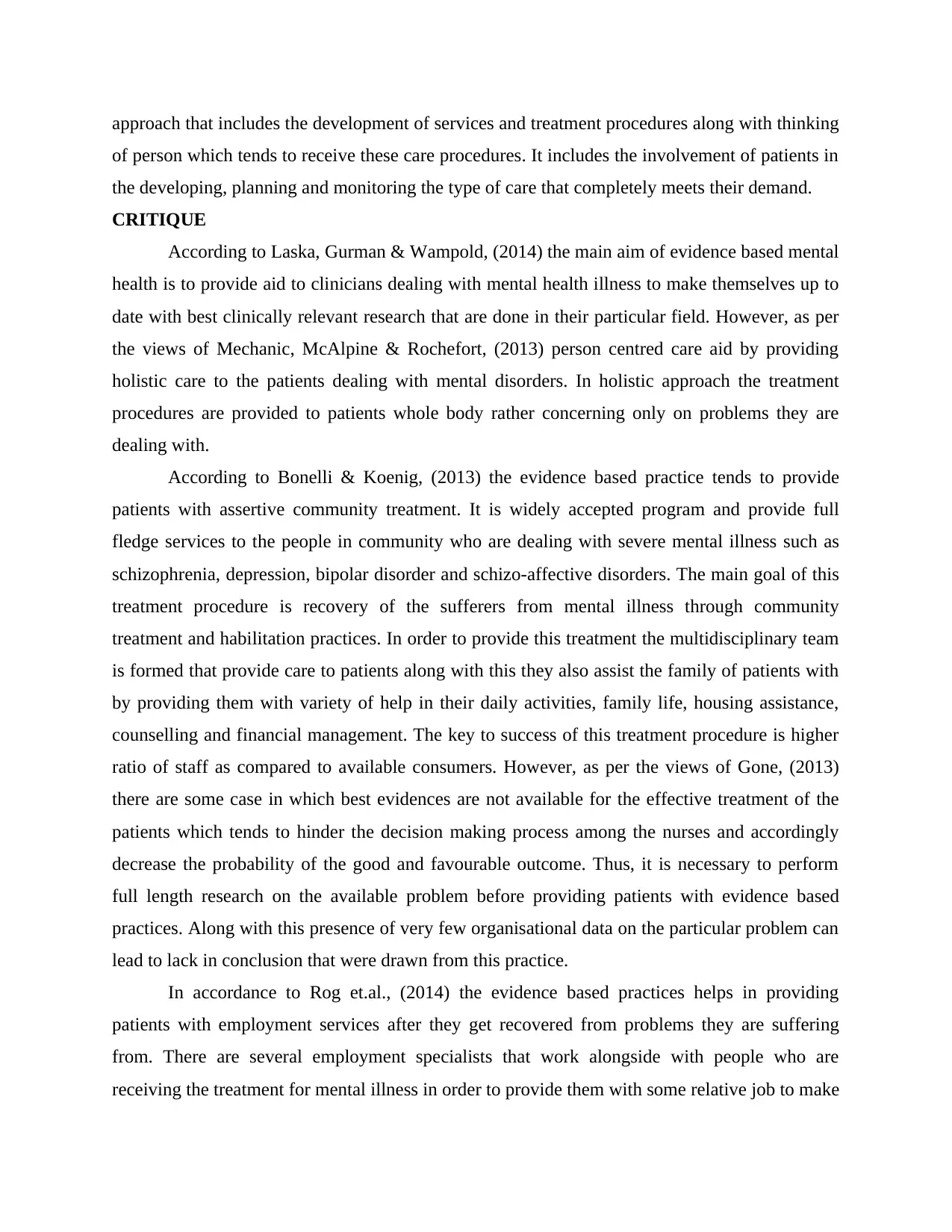
approach that includes the development of services and treatment procedures along with thinking
of person which tends to receive these care procedures. It includes the involvement of patients in
the developing, planning and monitoring the type of care that completely meets their demand.
CRITIQUE
According to Laska, Gurman & Wampold, (2014) the main aim of evidence based mental
health is to provide aid to clinicians dealing with mental health illness to make themselves up to
date with best clinically relevant research that are done in their particular field. However, as per
the views of Mechanic, McAlpine & Rochefort, (2013) person centred care aid by providing
holistic care to the patients dealing with mental disorders. In holistic approach the treatment
procedures are provided to patients whole body rather concerning only on problems they are
dealing with.
According to Bonelli & Koenig, (2013) the evidence based practice tends to provide
patients with assertive community treatment. It is widely accepted program and provide full
fledge services to the people in community who are dealing with severe mental illness such as
schizophrenia, depression, bipolar disorder and schizo-affective disorders. The main goal of this
treatment procedure is recovery of the sufferers from mental illness through community
treatment and habilitation practices. In order to provide this treatment the multidisciplinary team
is formed that provide care to patients along with this they also assist the family of patients with
by providing them with variety of help in their daily activities, family life, housing assistance,
counselling and financial management. The key to success of this treatment procedure is higher
ratio of staff as compared to available consumers. However, as per the views of Gone, (2013)
there are some case in which best evidences are not available for the effective treatment of the
patients which tends to hinder the decision making process among the nurses and accordingly
decrease the probability of the good and favourable outcome. Thus, it is necessary to perform
full length research on the available problem before providing patients with evidence based
practices. Along with this presence of very few organisational data on the particular problem can
lead to lack in conclusion that were drawn from this practice.
In accordance to Rog et.al., (2014) the evidence based practices helps in providing
patients with employment services after they get recovered from problems they are suffering
from. There are several employment specialists that work alongside with people who are
receiving the treatment for mental illness in order to provide them with some relative job to make
of person which tends to receive these care procedures. It includes the involvement of patients in
the developing, planning and monitoring the type of care that completely meets their demand.
CRITIQUE
According to Laska, Gurman & Wampold, (2014) the main aim of evidence based mental
health is to provide aid to clinicians dealing with mental health illness to make themselves up to
date with best clinically relevant research that are done in their particular field. However, as per
the views of Mechanic, McAlpine & Rochefort, (2013) person centred care aid by providing
holistic care to the patients dealing with mental disorders. In holistic approach the treatment
procedures are provided to patients whole body rather concerning only on problems they are
dealing with.
According to Bonelli & Koenig, (2013) the evidence based practice tends to provide
patients with assertive community treatment. It is widely accepted program and provide full
fledge services to the people in community who are dealing with severe mental illness such as
schizophrenia, depression, bipolar disorder and schizo-affective disorders. The main goal of this
treatment procedure is recovery of the sufferers from mental illness through community
treatment and habilitation practices. In order to provide this treatment the multidisciplinary team
is formed that provide care to patients along with this they also assist the family of patients with
by providing them with variety of help in their daily activities, family life, housing assistance,
counselling and financial management. The key to success of this treatment procedure is higher
ratio of staff as compared to available consumers. However, as per the views of Gone, (2013)
there are some case in which best evidences are not available for the effective treatment of the
patients which tends to hinder the decision making process among the nurses and accordingly
decrease the probability of the good and favourable outcome. Thus, it is necessary to perform
full length research on the available problem before providing patients with evidence based
practices. Along with this presence of very few organisational data on the particular problem can
lead to lack in conclusion that were drawn from this practice.
In accordance to Rog et.al., (2014) the evidence based practices helps in providing
patients with employment services after they get recovered from problems they are suffering
from. There are several employment specialists that work alongside with people who are
receiving the treatment for mental illness in order to provide them with some relative job to make
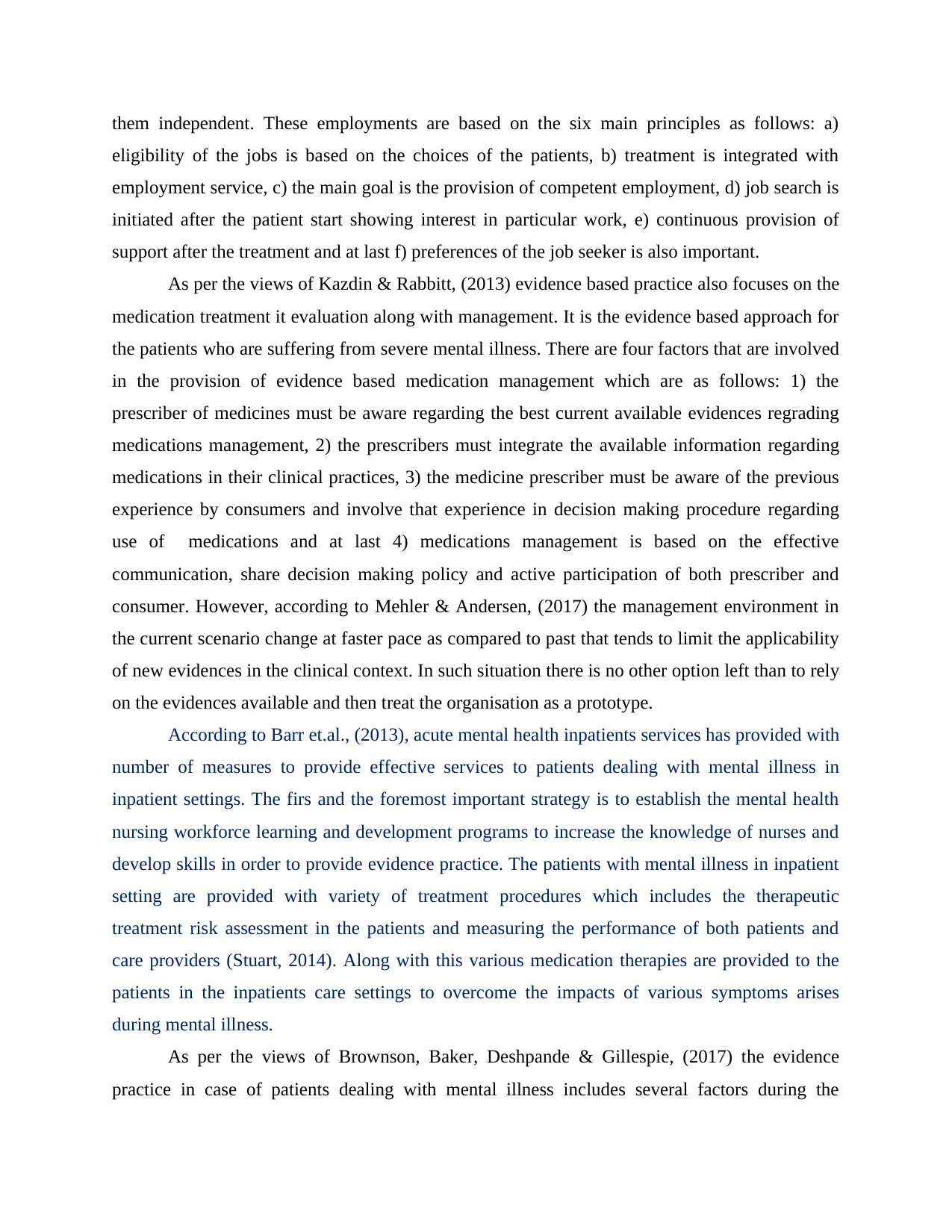
them independent. These employments are based on the six main principles as follows: a)
eligibility of the jobs is based on the choices of the patients, b) treatment is integrated with
employment service, c) the main goal is the provision of competent employment, d) job search is
initiated after the patient start showing interest in particular work, e) continuous provision of
support after the treatment and at last f) preferences of the job seeker is also important.
As per the views of Kazdin & Rabbitt, (2013) evidence based practice also focuses on the
medication treatment it evaluation along with management. It is the evidence based approach for
the patients who are suffering from severe mental illness. There are four factors that are involved
in the provision of evidence based medication management which are as follows: 1) the
prescriber of medicines must be aware regarding the best current available evidences regrading
medications management, 2) the prescribers must integrate the available information regarding
medications in their clinical practices, 3) the medicine prescriber must be aware of the previous
experience by consumers and involve that experience in decision making procedure regarding
use of medications and at last 4) medications management is based on the effective
communication, share decision making policy and active participation of both prescriber and
consumer. However, according to Mehler & Andersen, (2017) the management environment in
the current scenario change at faster pace as compared to past that tends to limit the applicability
of new evidences in the clinical context. In such situation there is no other option left than to rely
on the evidences available and then treat the organisation as a prototype.
According to Barr et.al., (2013), acute mental health inpatients services has provided with
number of measures to provide effective services to patients dealing with mental illness in
inpatient settings. The firs and the foremost important strategy is to establish the mental health
nursing workforce learning and development programs to increase the knowledge of nurses and
develop skills in order to provide evidence practice. The patients with mental illness in inpatient
setting are provided with variety of treatment procedures which includes the therapeutic
treatment risk assessment in the patients and measuring the performance of both patients and
care providers (Stuart, 2014). Along with this various medication therapies are provided to the
patients in the inpatients care settings to overcome the impacts of various symptoms arises
during mental illness.
As per the views of Brownson, Baker, Deshpande & Gillespie, (2017) the evidence
practice in case of patients dealing with mental illness includes several factors during the
eligibility of the jobs is based on the choices of the patients, b) treatment is integrated with
employment service, c) the main goal is the provision of competent employment, d) job search is
initiated after the patient start showing interest in particular work, e) continuous provision of
support after the treatment and at last f) preferences of the job seeker is also important.
As per the views of Kazdin & Rabbitt, (2013) evidence based practice also focuses on the
medication treatment it evaluation along with management. It is the evidence based approach for
the patients who are suffering from severe mental illness. There are four factors that are involved
in the provision of evidence based medication management which are as follows: 1) the
prescriber of medicines must be aware regarding the best current available evidences regrading
medications management, 2) the prescribers must integrate the available information regarding
medications in their clinical practices, 3) the medicine prescriber must be aware of the previous
experience by consumers and involve that experience in decision making procedure regarding
use of medications and at last 4) medications management is based on the effective
communication, share decision making policy and active participation of both prescriber and
consumer. However, according to Mehler & Andersen, (2017) the management environment in
the current scenario change at faster pace as compared to past that tends to limit the applicability
of new evidences in the clinical context. In such situation there is no other option left than to rely
on the evidences available and then treat the organisation as a prototype.
According to Barr et.al., (2013), acute mental health inpatients services has provided with
number of measures to provide effective services to patients dealing with mental illness in
inpatient settings. The firs and the foremost important strategy is to establish the mental health
nursing workforce learning and development programs to increase the knowledge of nurses and
develop skills in order to provide evidence practice. The patients with mental illness in inpatient
setting are provided with variety of treatment procedures which includes the therapeutic
treatment risk assessment in the patients and measuring the performance of both patients and
care providers (Stuart, 2014). Along with this various medication therapies are provided to the
patients in the inpatients care settings to overcome the impacts of various symptoms arises
during mental illness.
As per the views of Brownson, Baker, Deshpande & Gillespie, (2017) the evidence
practice in case of patients dealing with mental illness includes several factors during the
Secure Best Marks with AI Grader
Need help grading? Try our AI Grader for instant feedback on your assignments.
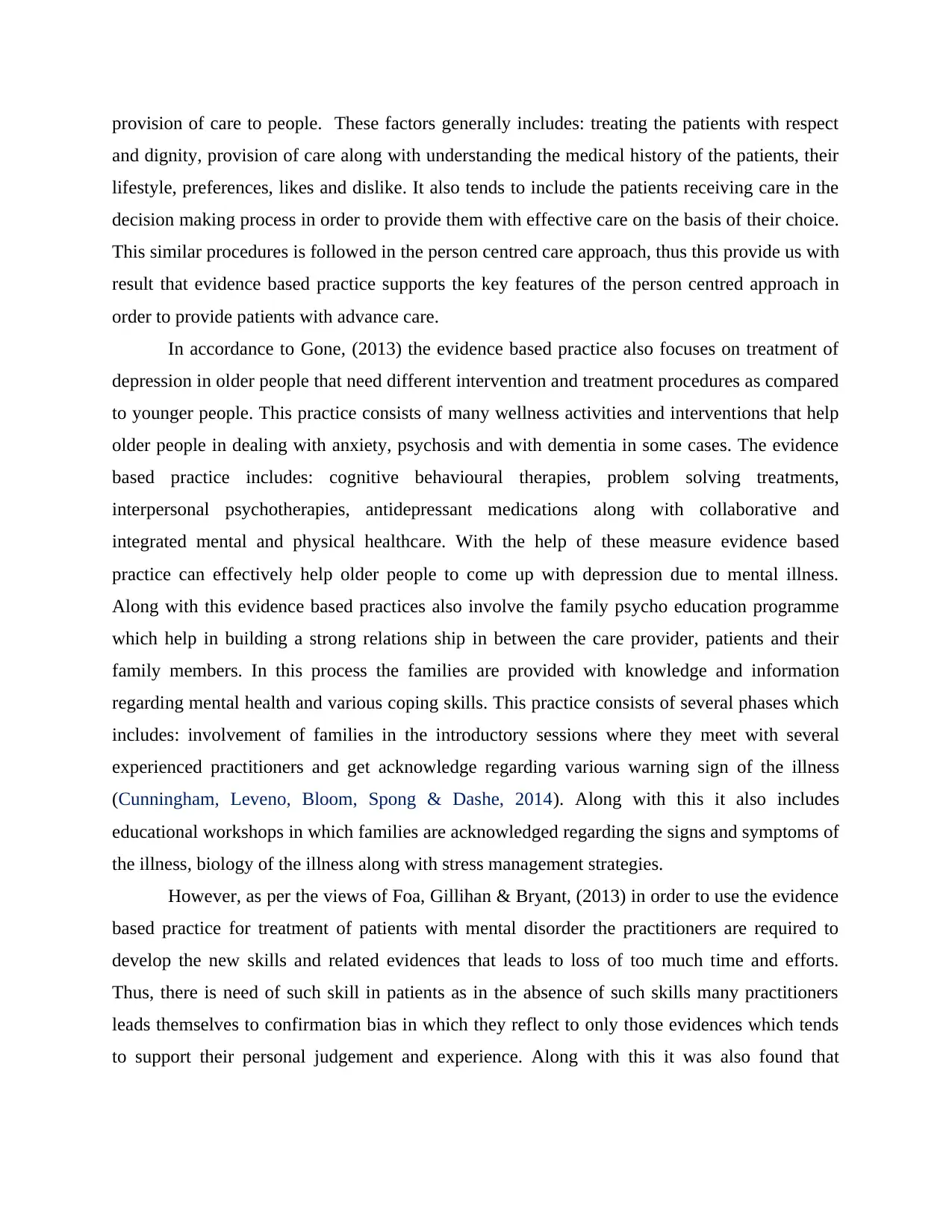
provision of care to people. These factors generally includes: treating the patients with respect
and dignity, provision of care along with understanding the medical history of the patients, their
lifestyle, preferences, likes and dislike. It also tends to include the patients receiving care in the
decision making process in order to provide them with effective care on the basis of their choice.
This similar procedures is followed in the person centred care approach, thus this provide us with
result that evidence based practice supports the key features of the person centred approach in
order to provide patients with advance care.
In accordance to Gone, (2013) the evidence based practice also focuses on treatment of
depression in older people that need different intervention and treatment procedures as compared
to younger people. This practice consists of many wellness activities and interventions that help
older people in dealing with anxiety, psychosis and with dementia in some cases. The evidence
based practice includes: cognitive behavioural therapies, problem solving treatments,
interpersonal psychotherapies, antidepressant medications along with collaborative and
integrated mental and physical healthcare. With the help of these measure evidence based
practice can effectively help older people to come up with depression due to mental illness.
Along with this evidence based practices also involve the family psycho education programme
which help in building a strong relations ship in between the care provider, patients and their
family members. In this process the families are provided with knowledge and information
regarding mental health and various coping skills. This practice consists of several phases which
includes: involvement of families in the introductory sessions where they meet with several
experienced practitioners and get acknowledge regarding various warning sign of the illness
(Cunningham, Leveno, Bloom, Spong & Dashe, 2014). Along with this it also includes
educational workshops in which families are acknowledged regarding the signs and symptoms of
the illness, biology of the illness along with stress management strategies.
However, as per the views of Foa, Gillihan & Bryant, (2013) in order to use the evidence
based practice for treatment of patients with mental disorder the practitioners are required to
develop the new skills and related evidences that leads to loss of too much time and efforts.
Thus, there is need of such skill in patients as in the absence of such skills many practitioners
leads themselves to confirmation bias in which they reflect to only those evidences which tends
to support their personal judgement and experience. Along with this it was also found that
and dignity, provision of care along with understanding the medical history of the patients, their
lifestyle, preferences, likes and dislike. It also tends to include the patients receiving care in the
decision making process in order to provide them with effective care on the basis of their choice.
This similar procedures is followed in the person centred care approach, thus this provide us with
result that evidence based practice supports the key features of the person centred approach in
order to provide patients with advance care.
In accordance to Gone, (2013) the evidence based practice also focuses on treatment of
depression in older people that need different intervention and treatment procedures as compared
to younger people. This practice consists of many wellness activities and interventions that help
older people in dealing with anxiety, psychosis and with dementia in some cases. The evidence
based practice includes: cognitive behavioural therapies, problem solving treatments,
interpersonal psychotherapies, antidepressant medications along with collaborative and
integrated mental and physical healthcare. With the help of these measure evidence based
practice can effectively help older people to come up with depression due to mental illness.
Along with this evidence based practices also involve the family psycho education programme
which help in building a strong relations ship in between the care provider, patients and their
family members. In this process the families are provided with knowledge and information
regarding mental health and various coping skills. This practice consists of several phases which
includes: involvement of families in the introductory sessions where they meet with several
experienced practitioners and get acknowledge regarding various warning sign of the illness
(Cunningham, Leveno, Bloom, Spong & Dashe, 2014). Along with this it also includes
educational workshops in which families are acknowledged regarding the signs and symptoms of
the illness, biology of the illness along with stress management strategies.
However, as per the views of Foa, Gillihan & Bryant, (2013) in order to use the evidence
based practice for treatment of patients with mental disorder the practitioners are required to
develop the new skills and related evidences that leads to loss of too much time and efforts.
Thus, there is need of such skill in patients as in the absence of such skills many practitioners
leads themselves to confirmation bias in which they reflect to only those evidences which tends
to support their personal judgement and experience. Along with this it was also found that
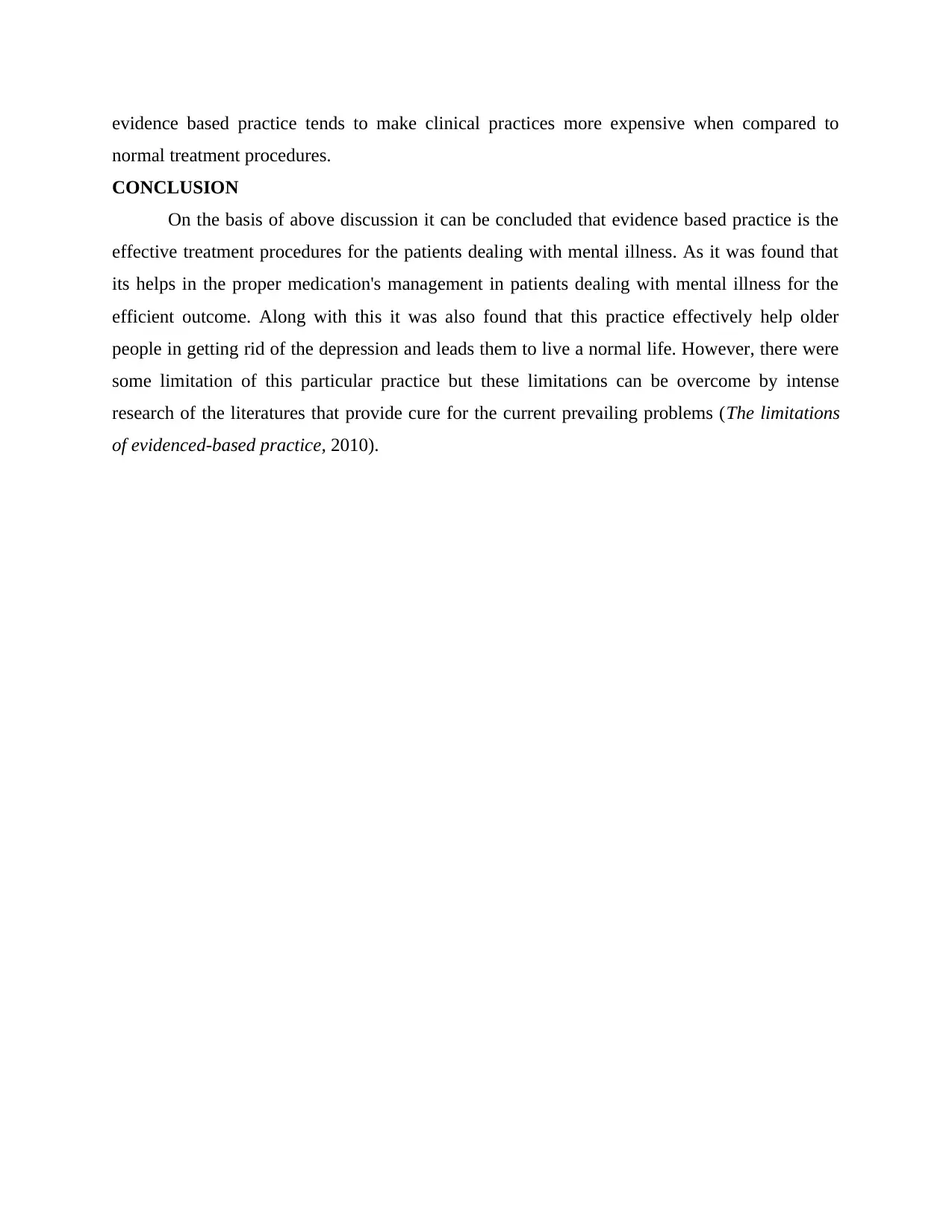
evidence based practice tends to make clinical practices more expensive when compared to
normal treatment procedures.
CONCLUSION
On the basis of above discussion it can be concluded that evidence based practice is the
effective treatment procedures for the patients dealing with mental illness. As it was found that
its helps in the proper medication's management in patients dealing with mental illness for the
efficient outcome. Along with this it was also found that this practice effectively help older
people in getting rid of the depression and leads them to live a normal life. However, there were
some limitation of this particular practice but these limitations can be overcome by intense
research of the literatures that provide cure for the current prevailing problems (The limitations
of evidenced-based practice, 2010).
normal treatment procedures.
CONCLUSION
On the basis of above discussion it can be concluded that evidence based practice is the
effective treatment procedures for the patients dealing with mental illness. As it was found that
its helps in the proper medication's management in patients dealing with mental illness for the
efficient outcome. Along with this it was also found that this practice effectively help older
people in getting rid of the depression and leads them to live a normal life. However, there were
some limitation of this particular practice but these limitations can be overcome by intense
research of the literatures that provide cure for the current prevailing problems (The limitations
of evidenced-based practice, 2010).
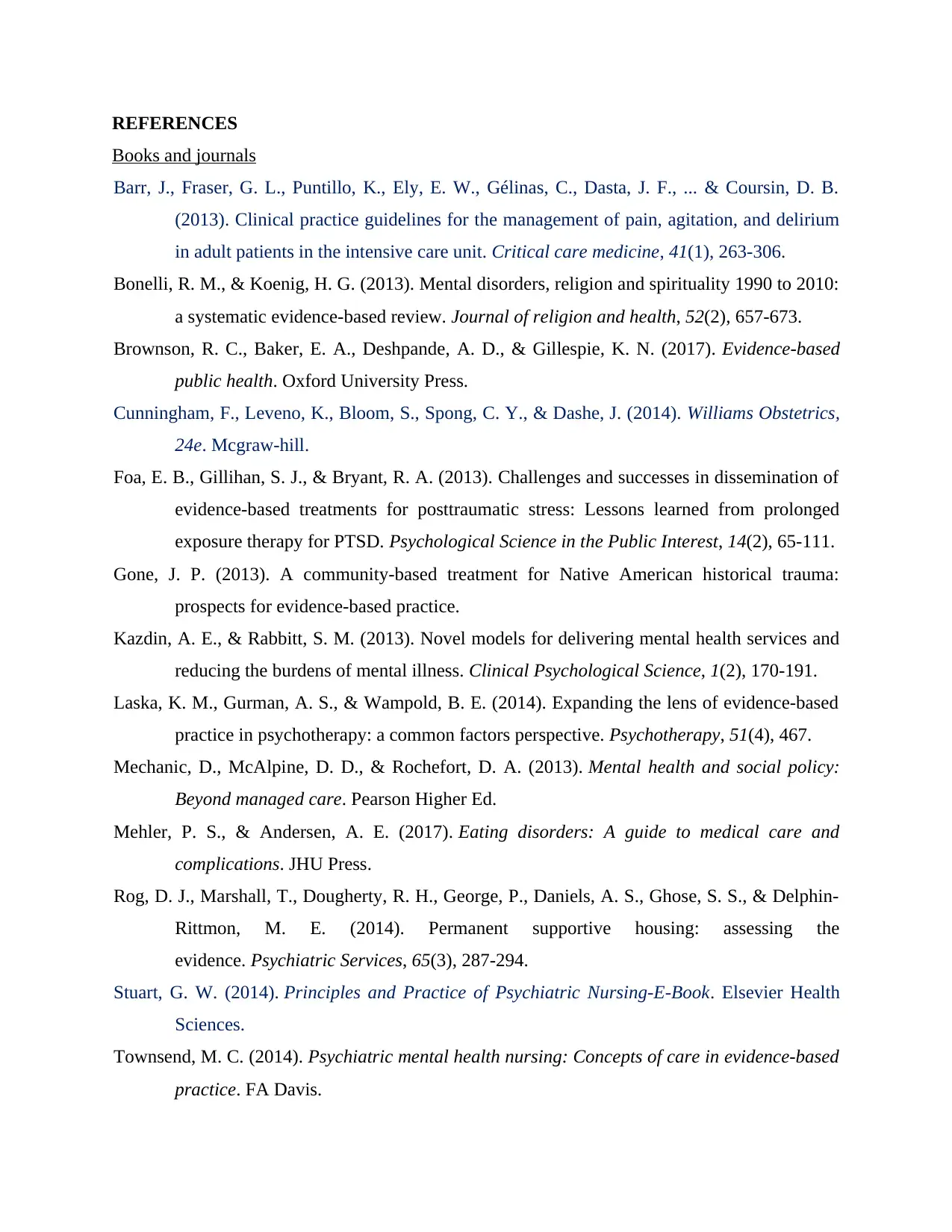
REFERENCES
Books and journals
Barr, J., Fraser, G. L., Puntillo, K., Ely, E. W., Gélinas, C., Dasta, J. F., ... & Coursin, D. B.
(2013). Clinical practice guidelines for the management of pain, agitation, and delirium
in adult patients in the intensive care unit. Critical care medicine, 41(1), 263-306.
Bonelli, R. M., & Koenig, H. G. (2013). Mental disorders, religion and spirituality 1990 to 2010:
a systematic evidence-based review. Journal of religion and health, 52(2), 657-673.
Brownson, R. C., Baker, E. A., Deshpande, A. D., & Gillespie, K. N. (2017). Evidence-based
public health. Oxford University Press.
Cunningham, F., Leveno, K., Bloom, S., Spong, C. Y., & Dashe, J. (2014). Williams Obstetrics,
24e. Mcgraw-hill.
Foa, E. B., Gillihan, S. J., & Bryant, R. A. (2013). Challenges and successes in dissemination of
evidence-based treatments for posttraumatic stress: Lessons learned from prolonged
exposure therapy for PTSD. Psychological Science in the Public Interest, 14(2), 65-111.
Gone, J. P. (2013). A community-based treatment for Native American historical trauma:
prospects for evidence-based practice.
Kazdin, A. E., & Rabbitt, S. M. (2013). Novel models for delivering mental health services and
reducing the burdens of mental illness. Clinical Psychological Science, 1(2), 170-191.
Laska, K. M., Gurman, A. S., & Wampold, B. E. (2014). Expanding the lens of evidence-based
practice in psychotherapy: a common factors perspective. Psychotherapy, 51(4), 467.
Mechanic, D., McAlpine, D. D., & Rochefort, D. A. (2013). Mental health and social policy:
Beyond managed care. Pearson Higher Ed.
Mehler, P. S., & Andersen, A. E. (2017). Eating disorders: A guide to medical care and
complications. JHU Press.
Rog, D. J., Marshall, T., Dougherty, R. H., George, P., Daniels, A. S., Ghose, S. S., & Delphin-
Rittmon, M. E. (2014). Permanent supportive housing: assessing the
evidence. Psychiatric Services, 65(3), 287-294.
Stuart, G. W. (2014). Principles and Practice of Psychiatric Nursing-E-Book. Elsevier Health
Sciences.
Townsend, M. C. (2014). Psychiatric mental health nursing: Concepts of care in evidence-based
practice. FA Davis.
Books and journals
Barr, J., Fraser, G. L., Puntillo, K., Ely, E. W., Gélinas, C., Dasta, J. F., ... & Coursin, D. B.
(2013). Clinical practice guidelines for the management of pain, agitation, and delirium
in adult patients in the intensive care unit. Critical care medicine, 41(1), 263-306.
Bonelli, R. M., & Koenig, H. G. (2013). Mental disorders, religion and spirituality 1990 to 2010:
a systematic evidence-based review. Journal of religion and health, 52(2), 657-673.
Brownson, R. C., Baker, E. A., Deshpande, A. D., & Gillespie, K. N. (2017). Evidence-based
public health. Oxford University Press.
Cunningham, F., Leveno, K., Bloom, S., Spong, C. Y., & Dashe, J. (2014). Williams Obstetrics,
24e. Mcgraw-hill.
Foa, E. B., Gillihan, S. J., & Bryant, R. A. (2013). Challenges and successes in dissemination of
evidence-based treatments for posttraumatic stress: Lessons learned from prolonged
exposure therapy for PTSD. Psychological Science in the Public Interest, 14(2), 65-111.
Gone, J. P. (2013). A community-based treatment for Native American historical trauma:
prospects for evidence-based practice.
Kazdin, A. E., & Rabbitt, S. M. (2013). Novel models for delivering mental health services and
reducing the burdens of mental illness. Clinical Psychological Science, 1(2), 170-191.
Laska, K. M., Gurman, A. S., & Wampold, B. E. (2014). Expanding the lens of evidence-based
practice in psychotherapy: a common factors perspective. Psychotherapy, 51(4), 467.
Mechanic, D., McAlpine, D. D., & Rochefort, D. A. (2013). Mental health and social policy:
Beyond managed care. Pearson Higher Ed.
Mehler, P. S., & Andersen, A. E. (2017). Eating disorders: A guide to medical care and
complications. JHU Press.
Rog, D. J., Marshall, T., Dougherty, R. H., George, P., Daniels, A. S., Ghose, S. S., & Delphin-
Rittmon, M. E. (2014). Permanent supportive housing: assessing the
evidence. Psychiatric Services, 65(3), 287-294.
Stuart, G. W. (2014). Principles and Practice of Psychiatric Nursing-E-Book. Elsevier Health
Sciences.
Townsend, M. C. (2014). Psychiatric mental health nursing: Concepts of care in evidence-based
practice. FA Davis.
Paraphrase This Document
Need a fresh take? Get an instant paraphrase of this document with our AI Paraphraser

Online
The limitations of evidenced-based practice. (2010). [Online]. Available through
<https://www.ncbi.nlm.nih.gov/pubmed/20558652>. [Accessed on 21st October 2017].
The limitations of evidenced-based practice. (2010). [Online]. Available through
<https://www.ncbi.nlm.nih.gov/pubmed/20558652>. [Accessed on 21st October 2017].
1 out of 8
Related Documents
Your All-in-One AI-Powered Toolkit for Academic Success.
+13062052269
info@desklib.com
Available 24*7 on WhatsApp / Email
![[object Object]](/_next/static/media/star-bottom.7253800d.svg)
Unlock your academic potential
© 2024 | Zucol Services PVT LTD | All rights reserved.




